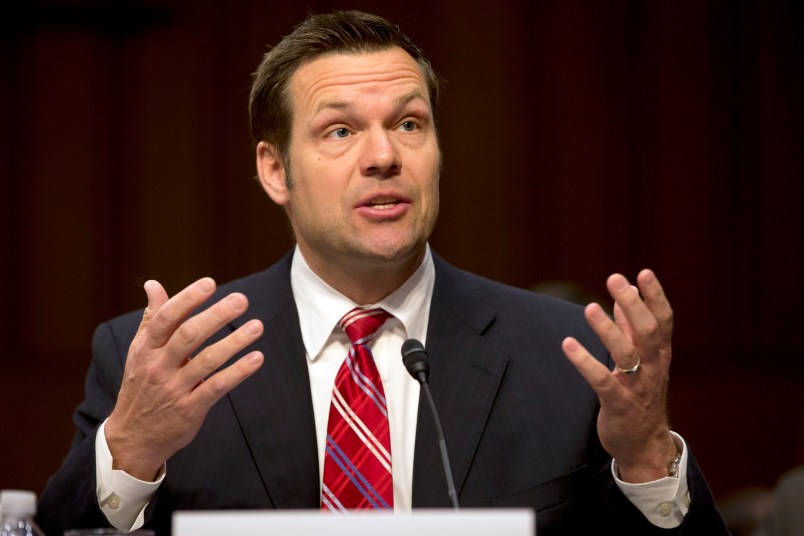UPDATE: 4:05 p.m. In an unexpected twist, Kobach’s office is ordering election officials to send out overseas military ballots without a Democratic candidate for U.S. Senate. His office would not say, however, what would happen next if the state Democratic Party eventually nominated a new candidate, as Kobach has said they should.
More here.
After his Thursday defeat at the Kansas Supreme Court, Secretary of State Kris Kobach unveiled a new plan to make sure a Democratic candidate is on the ballot in the state’s Senate race. He would push back the mailing date for ballots sent to overseas military members and argue under state law that Democrats must name somebody to replace withdrawn nominee Chad Taylor.
But to move the mailing date for overseas military ballots from Sept. 20 to Sept. 27, as Kobach said Thursday that he would, he would need federal approval. And as of Friday afternoon, federal officials told TPM, he hasn’t sought it.
The federal MOVE Act requires state election officials to send ballots to overseas military voters 45 days before the election. That would be Sept. 20 this year. States are, however, allowed to request a waiver if an “undue hardship” resulting from a legal contest arises — and election law experts say that this circumstance would likely qualify.
Kobach’s argument for a waiver would likely be that because the litigation over whether Democratic nominee Chad Taylor should remain on the November ballot was not resolved until Thursday, two days before the 45-day deadline, he needs the additional time so Democrats can name a new candidate, as Kobach argues they are required to do.
To get a waiver, Kobach must submit his case to the Defense Department’s Federal Voter Assistance Program, which oversees enforcement of the MOVE Act. The FVAP office is then required under the law to consult with the Justice Department’s Voting Section before approving it.
As of early Friday afternoon, the FVAP office told TPM that it had not received a waiver from Kansas or been consulted by Kobach’s office about a waiver.
“We have not received a waiver request from Kansas and have not had communication with the State about a waiver request,” FVAP spokeswoman Amanda Richmond said in an email.
Kobach said Thursday that federal law would allow him to move the date, according to the Wichita Eagle, but he has yet to take the official steps he would need to to make it happen. Meanwhile, a local Kansas election official told TPM that he had been told that information about a waiver would be coming Friday.
“We’ve been told it will be sent out to us some time today,” Jamie Shew, the Douglas County Clerk and a Democrat, told TPM. “It has been drilled into us by the secretary of state’s office: This deadline is really really important to meet.”
In the end, the timing of Kobach’s request for a waiver might not matter, election law experts told TPM. The waiver could effectively be applied retroactively. It is common, experts said, for a waiver to extend the due date for ballots beyond Election Day by the same number of days that their initial mailing was delayed.
Mark Johnson, an election law expert at the University of Kansas, didn’t foresee any problem for Kobach getting a waiver — if he got around to submitting one.
“I would think that it would be granted,” he said. “This is the kind of situation that the law anticipates.”
But if he didn’t, that would open up a world of trouble, Steve Huefner, a law professor at Ohio State University, told TPM. He would open himself up to a lawsuit from the Justice Department for failing to comply with the law, and in the event of a close election that might be determined by the late-arriving absentee ballots, the whole election could be challenged in court, he said.
“If they didn’t get the waiver, they’d likely be subject to some litigation,” Huefner said. “If they do get a waiver and the election is still really close, somebody could bring it up, but it’s unlikely that a court would find some way of invalidating the election.”









